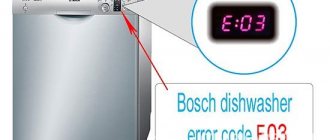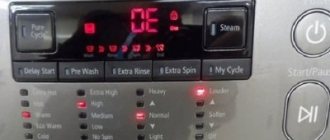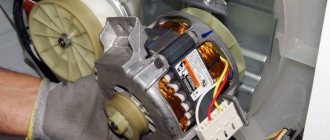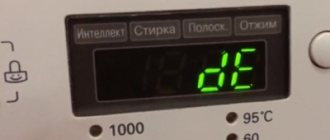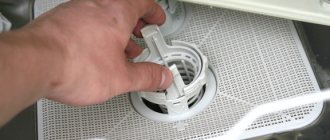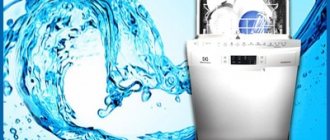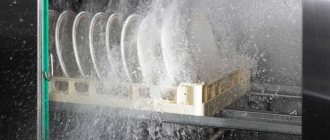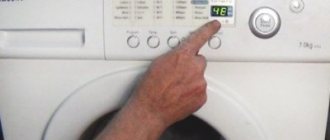Option 1. Rinse aid
As is the case with a washing machine that uses powder, a dishwasher will not wash dishes without the use of special products. Often, the cause of poor laundering is the incorrect use of rinse aid.
Every dishwasher, be it Ariston or Bosch, has a so-called rinse aid supply regulator. A lot depends on its correct settings. So, if you reduce the supply of rinse aid, the dishes will come out dry, but with obvious stains that have not been washed off.
And vice versa, if you sharply increase the supply of rinse aid, the dishes will be spotless, but too wet, with drops and streaks (or you will have to additionally wipe each plate, which is labor-intensive). Therefore, carefully read the instructions for your machine to determine which mode is optimal. In most models, the optimal rinse aid supply mode is set to four.
Internal reasons
The circulation pump is broken
The circulation pump pumps water into the internal compartment of the PMM. Due to problems with this important part, the fluid supply may be blocked. The failed part must be replaced with a new one, otherwise the PMM washing program will simply stop turning on.
Sprinkler impeller does not rotate
The impeller is an element of the mechanism due to which the rocker arm with sprinklers rotates. If the part does not work well, the water is distributed unevenly and the dishes are poorly washed. Diagnostics and repairs should be entrusted to professionals.
Heating element burnt out
The thermoelectric heater heats water to the desired temperature. It is on this structural element that most often a large amount of scale accumulates. If it is not removed in a timely manner, the service life of the part is significantly reduced and it quickly burns out. Sometimes the metal cracks and holes appear in the insulation, and the PMM body begins to shock.
At low temperatures, dishes are very difficult to rinse, and the washing powder leaves traces.
Temperature sensor failure
We measure the temperature sensor of the water entering the dishwasher (all models of the companies have them: Bosch, Ariston, Electrolux, Veko, Virpul, Ikea, Indesit, Siemens, Hansa). The thermal relay receives the specified information and transmits it to a specialized electronic module, which, in turn, gives the command to carry out heating.
In the event of a breakdown, the transmitted information is unreliable or is not transmitted at all, and washing is done in cold water. The quality of washing is significantly reduced. In this case, the sensor needs to be replaced.
The control module is glitchy
The control module is the “brain” of the PMM, thanks to which commands are sent to all nodes of the device. Due to incorrect operation of the software board, the sequence of processes (draining, heating, etc.) and their duration fail. With such a problem, you should contact the service center to reflash or replace the module.
Turbidity sensor gives incorrect readings
A water turbidity controller, as a rule, is available only in expensive premium equipment (Bosch, Siemens). The aquasensor determines the degree of contamination and reacts even to small particles of dirt, launching an additional rinse cycle or adding water. When the sensitivity of the sensor decreases (for example, due to scale), the performance of the PMM deteriorates.
The ion exchanger has exhausted its resource
As a rule, the ion exchanger does not break, but consumables in it can run out of resources - granules of levatite ion exchange resin, which allow water to be regenerated. To restore the functionality of the part, it is necessary to replace the ionized resin in the container with a new one.
Option 3. Incorrectly selected mode
If you use special tablets and other solvents for washing, then pay attention to the mode in which the washing takes place. Each tablet has such a concept as dissolution time and temperature.
So, if you use an express wash with water heating less than 50 g. the tablet simply may not have time to dissolve. As a result, the dishes were not washed, and the money for the product was wasted.
Therefore, read the instructions for use of the product and choose the mode that will allow you to use this product with maximum efficiency.
The dishwasher does not wash dishes well. What could be the reasons?
1. Detergent
When washing dishes, it is advisable to use detergents recommended by the manufacturer. Usually the finish is calgonite. BUT this does not mean that other means cannot be used. As the saying goes. Everything is relative. Cheap detergents often do not perform their function very well. The dishes are washed of course. But if compared with good products. Quality may vary noticeably. If you haven't changed the detergent. And the quality of washing has dropped. The problem is obviously different. It is worth considering that hypoallergenic products are safe. But over time, they can lead to a deterioration in the quality of washing and the formation of a white coating.
2. Blockages and fatty deposits
Has your dishwasher become difficult to clean over time? In its device it has many tubes, sensors, and holes. Through which in the process of washing dishes. Water is leaking. For several years, if prevention is not performed. These parts may become partially or completely clogged. The pressure in the water circulation system decreases. Sensors may produce incorrect data. This results in the wash cycle being completed from start to finish. But the dishes remain dirty or not washed enough.
3.Faulty water flow switch (actuator)
If the actuator is faulty. Usually dishes don't wash well in one of the baskets. (In some cases in all baskets). This part distributes water pressure alternately to different levels of the dishwasher. This was done to improve the quality of washing and reduce the volume of the device. If the switch is not working properly, you can sometimes hear a rattling sound in the dishwasher. Also, the fault may turn out to be “floating” - a dishwasher does not always clean well. Sometimes washing dishes works well.
4.Insufficient water level
The dishwasher does not fill completely with water. Failure of fill level sensors and fill valves. If any parts do not work correctly, the dishwasher will also not clean well. To maintain normal pressure in the dishwasher. It requires a certain amount of water. If you increase it, overflow will occur. And if you reduce the pressure, it will decrease, and the dishwasher will become worse at washing dishes.
5.Insufficient water heating
As you know, dishwashers wash dishes with hot water. Temperature from 45 to 70 degrees. If for some reason. The dishwasher does not heat the water and the wash remains cold. There is no question of any quality of washing. Also with insufficient heating. The dishes remain wet because the dryer stops working.
Rarely, but still, a problem occurs when dishes in the dishwasher are washed well. But on its surface there are scattered small particles of food residues. This can happen if during washing, at the end of the pre-rinse cycle. Place a couple of plates in the dishwasher. If the filter mesh breaks or the filter does not close tightly. The picture will be similar.
Option 4. Incorrect placement of dishes in the washing basket
Also, the “washability” is directly affected by the correct placement of dishes in the basket. If the laying is too dense, detergents, rinse aid and water will not reach each individual plate or cup.
The upper basket, as a rule, is loaded with light and small dishes, such as cups, plates, spoons and forks. Glasses and glasses are placed upside down on special holders.
In turn, the lower basket is designed for storing heavy and dirty dishes, such as pots, pans, large plates and dishes. Pay attention to the holders that are found in almost every dishwasher model. They can be folded back freely and thus increase the useful volume of the basket.
Operational errors
The most common mistake that equipment owners make is putting dishes and cutlery with dried food residues into the dishwasher. If, in addition, the kitchen utensils have been dirty for several days, then pre-soaking will not help. Manufacturers warn about this in their instructions.
If the housewife does not clean the dishes from dried food and does not turn on the soaking mode, it will not be possible to completely get rid of the dirt
Another mistake housewives make is the wrong choice of the PMM work program. For example, trying to wash dishes with serious stains in standard or economy mode. For such utensils, you should choose programs with maximum water temperature, pre-soaking, as well as long-term intensive washing and double rinsing. Only in this case can a satisfactory result be obtained.
The operating program is selected on the control panel located at the end of the door of the built-in dishwasher
Overloading baskets with kitchen utensils is also a common occurrence. Users do not understand that in this case, sprayers (hereinafter also referred to as sprinklers) will not be able to treat the entire surface of bowls, plates, spoons and forks with detergent and rinse aid.
The closer the utensils are to each other, the harder it is to wash them. So it is necessary to strictly follow the instructions for placing dishes in the PMM working hopper. There must be gaps between plates, bowls and other utensils so that liquid can freely fall on and drain from the surfaces.
The dishwasher must be loaded strictly according to the rules recommended by the manufacturer
A negative result when washing kitchen utensils is observed when a low-quality or unsuitable detergent is used. For example, you cannot use household chemicals intended for hand washing for PMM. This threatens excessive foaming and failure of the machine. A low-quality detergent simply will not wash the dishes. The same applies to the rinse aid - cloudy stains will remain on the glass glasses.
This is what happens when you overdose on detergent
An overdose of drugs intended for use in a dishwasher is also unacceptable, as this is fraught with unforeseen consequences (see photo). If all the errors in using the PMM are corrected or not allowed, but it still does not wash kitchen utensils properly, the cause may be improper care of the device.
Option 5. Sprinkler
Another reason why the machine may not wash dirty dishes well is that the water sprayer is clogged. The main function of the sprinkler, as the name implies, is to spray water evenly along the entire contour of the PM.
So, the water at the sprinkler comes out through special holes, which over time become clogged with food debris. The result is a decrease in water pressure and, as a consequence, a deterioration in the “washability” indicator.
What to do in this case. It's simple. We remove the sprinkler (this is very easy to do) and wash it under running tap water. Put it back and enjoy the result. And for the future, remove leftover food from the plates before putting the dishes in the sink. Then your sprinkler will clog much less often.
Untimely cleaning of PMM parts
A dishwasher, like any household appliance, requires careful care and timely cleaning of individual parts and components. The following elements in the unit are subject to regular cleaning:
- The tank must be cleaned of plaque.
- Coarse filter, which is installed on the inlet hose. It can become clogged with rust or small particles of scale that form when welding pipes during pipeline repair.
- The water sprinklers (rocker arms) can be carefully removed for cleaning. They become clogged with food debris or limescale. Due to the insufficient diameter of the holes in the nozzles, the pressure of the sprayed water is reduced, and therefore the dishwasher does not rinse the contents effectively. The upper rocker arm is unscrewed, and the lower one is removed by sliding upwards. Clean the injectors with a regular toothpick under a good stream of water. Also, cleaning can be done without removing the spray arms by running the device in idle mode with the addition of a special descaling agent, which will dissolve grease in the nozzles and limescale deposits. This descaling procedure will also be useful for the heating element.
- The main filter, which is installed at the bottom of the tank. It is a fine mesh that can be easily removed. You need to wash it regularly, and at least once a week.
Rinsing the PMM using a special product should be carried out once every six months. And this does not depend on the frequency of use of the unit.
After each completion of the utensil washing program, the appliance should be checked for any food residues that may be in the machine's tank or under the door, especially if it is a Bosch dishwasher.
Option 6. The water supply hose is pinched
It also happens that in the process of moving the machine (well, it was in your way, and you decided to move it), the water supply hose was pinched or kinked. Or maybe the corrugated hose was initially connected incorrectly. As a result, water begins to flow poorly into the system and there is not enough for a full washing cycle.
More: Repairing an Electrolux dishwasher, error codes
Basic malfunctions and ways to solve them
- The worst enemy of a dishwasher is scale. This kind of coating may prevent water from spraying, which is why breakdown occurs. To solve this problem, just pour citric acid inside the car and start idling at maximum temperature;
- Debris can be the biggest problem with your assistant's breakdown. You should not put food in the dishwasher if there are food residues, bones or napkins on it. With such a filling, not only will it not be able to wash your dishes, it will absolutely not be able to work. From time to time it is worth checking the machine filter to ensure there are no blockages;
- The heating element has failed. If this happens, then only replacing it will help;
- Problems in the circular pump will lead to the fact that it will also need to be replaced with a new one;
- A breakdown of the water turbidity sensor also means that it needs to be replaced. Of course, the water may remain cloudy, but you won’t see a particularly positive result on the dishes.
Circular pump failure
This pump is necessary to pump water inside the dishwasher. In those cases when it fails, water stops flowing into the department with dishes to wash them. You will be able to recognize this problem very easily, since the washing process will not start at all.
If this unit breaks down, the water supply is blocked, and as a result, the dishwashing process stops.
Sprinkler impeller problem
The impeller will help rotate the rocker arms in which the sprinkler is located. If the impeller fails, the sprinkler will stop rotating, and then a malfunction will begin either in one compartment of the sprinkler or in both at once. This is how the water begins to wash dishes poorly.
If it fails, water stops flowing normally, and the quality of washing tends to zero.
Fault in the heating element
Each dishwasher has a device that is needed to heat water. This element is most vulnerable to scale. Its frequent use leads to the fact that it simply burns out. If the heating element fails, then you should forget that you could wash the dishes in the dishwasher. This is because it is impossible to wash dishes properly in cold water.
Sometimes, for various reasons, the heating element stops working. As a rule, this is due to the fact that scale has accumulated on its surface.
Turbidity sensor failure
The turbidity sensor is usually only found on the most expensive dishwasher models. The sensor sends information about the state of the water to the program module to decide whether to continue washing the dishes. If a breakdown occurs, the sensor simply does not understand what “clean” water is and what “dirty” water is. As a rule, a machine in this state cannot operate normally and complete the process correctly.
Such an indicator is installed in advanced PMMs, for example, Bosch, Indesit and other quite expensive models.Control module performance
The control module is a kind of commander that sends information to other parts of the dishwasher. For example, this includes the command “draw water”, “heat water”, etc. Once the module fails, it simply stops giving commands and, therefore, the machine only needs to be repaired.
The memory of this device contains programs necessary for the efficient operation of the machine.
Option 7. The filter is clogged
Many housewives overlook such an important procedure as cleaning the dishwasher filter. But in vain. The filter takes care of all the unpleasant things that happen during washing - it removes food particles and large contaminants.
And, of course, it gets clogged quickly. Therefore, in order for dishwashing to be as efficient as possible, it is recommended to clean the filter as often as possible. Someone says that you need to do this after every wash. This is ideal, but not required. Do this at least every 3-4 washes, and only if a lot of dirty dishes were loaded.
The filter will also not clog quickly if you thoroughly clean it of large food residues before loading dishes.
Causes of poor dishwashing
The quality of washing dishes depends on many factors, which some of us for some reason simply neglect, saying that the dishwasher already washes everything well. However, at first the car will really show excellent results. But gradually, from time to time, you will notice food residues on the dishes, stains or a white coating. The reasons for this may be the following:
- user errors when operating the machine;
- untimely cleaning of the dishwasher and its parts;
- refusal to use special detergents or their incorrect dosage.
Let's take a closer look at these reasons, and also figure out what to do to make the car wash better.
The dishwasher was not cleaned in time
A dishwasher, like any other kitchen appliance, requires constant care. And if this care is not carried out, then it will simply stop functioning. The dishwasher needs to be cleaned regularly:
- filter for food debris;
- coarse filling filter;
- rocker arms (water sprinklers) from blockages
- anti-scale heating element;
- plaque tank.
The filter located at the bottom of the dishwasher, which is a fine mesh,
must be washed at least once a week.
It’s very easy to do, just don’t forget. The coarse flow filter, located at the entrance to the dishwasher, to which the inlet hose is screwed, also needs to be cleaned, although not as often. There may be large particles of impurities in the water, especially after cleaning the pipes in the house.
If water flows through the filter mesh, then over time the particles will clog it, and the water supply pressure to the machine will be weaker. This will lead to the machine being less able to wash dishes. Not only the filter, but also the nozzles (holes) in the rocker arms can become clogged with food debris. If the machine is not thoroughly cleaned in a timely manner, limescale may form inside the openings. All this will lead to a decrease in water supply pressure, and dishes may not be washed well. To clean the rocker arms, you need to run a dry wash (without dishes) with a special detergent. Such a wash will also rid the heating element of scale, and the tank of the machine from plaque, grease and other contaminants.
For your information! You should wash your dishwasher with detergent at least once every six months, no matter how often you use the machine.
After each wash, you need to check if the tank of the machine is dirty, if there are any food residues under the door, this happens in some models of Bosch dishwashers. And be sure to wipe everything with a dry cloth.
When you can’t do without the help of a specialist
The above mentioned are faults that, in principle, can be fixed with your own hands, but there are also a number of complex breakdowns. To eliminate them, you will have to contact the service department and call a specialist to your home, since performing maintenance or repairs requires knowledge of the procedure for disassembling the machine and removing defective components. At the same time, a specialist can diagnose PMM.
To eliminate complex breakdowns, you will have to contact the service department and call a specialist to your home.
Circulation pump malfunction
If this unit breaks down, the water supply is blocked, and as a result, the dishwashing process stops. In such a situation, there is only one way out, replacing it. To maintain the efficiency of the dishwasher, it is worth installing, so to speak, a native, suitable pump.
If the circulation pump breaks down, the water supply is blocked and, as a result, the dishwashing process stops.
Control module operation error
The basic task of this device is to control the operation of the machine. And at the slightest malfunction, interruptions begin in operation, etc. This problem can only be eliminated by replacing the control module.
This problem can only be resolved by replacing the control module.
Broken recirculation pump
The task of this device is to pump water into the system and supply it to the working chamber. When it breaks down, the water pressure in the machine drops and it stops working. The way out of this situation is quite simple, replacement or repair, but you should not do this yourself.
If the recirculation pump breaks down, the water pressure in the machine drops and it stops working.
Failure or malfunction of the software module
The memory of this device contains programs necessary for the efficient operation of the machine. Even a small malfunction in its operation leads to program errors, that is, the operating modes are distorted, which certainly affects the quality of washing kitchen utensils. What to do if your dishwasher doesn't wash dishes well? There are two methods - either repairing the module or replacing it.
The memory of the device's software module contains programs necessary for the efficient operation of the machine.
Burnt out heating element (water heater)
Sometimes, for various reasons, the heating element stops working. As a rule, this is due to the fact that scale has accumulated on its surface. It makes it difficult to transfer heat, and for full operation the heating element must consume more energy. In the end, he simply burns out. This unit cannot be repaired, and therefore it is simply replaced.
The heating element cannot be repaired, and therefore it is simply replaced.
Damage to the water turbidity sensor in the dishwasher
Such an indicator is installed in advanced PMMs, for example, Bosch, Indesit and other quite expensive models. Its task is to monitor water quality. When a certain level of water turbidity is reached, it transmits a corresponding signal to the controller. And if the Bosch dishwasher does not wash dishes well because of this, then there is only one way out - replacing the sensor.
The purpose of a water turbidity sensor is to monitor water quality.
Sprinkler impeller failure
An impeller is a device necessary for spraying water in the working chamber. If it fails, water stops flowing normally, and the quality of washing tends to zero. The solution is to change this node.
An impeller is a device necessary for spraying water in the working chamber.
Thermal relay burnt out
The key mission of this indicator is to monitor the heating level of water supplied for washing kitchen utensils. It transmits this information to the control unit, which decides whether to continue heating or stop. If the indicator fails, the dishes will be washed in cold water, and this will negatively affect the quality of the wash. It needs to be replaced.
If the indicator fails, the dishes will be washed in cold water, and this will negatively affect the quality of the wash.
If the dishwasher does not wash dishes, you must remember that this is a rather complex device, and its operation requires strict adherence to the instructions. You should not replace worn or broken components yourself; such work requires certain knowledge and special skills. In addition, you may need a special tool that is used only for repairing the PMM, and disassembling the machine yourself may lead to the fact that you either have to send it for major repairs or dispose of it.
